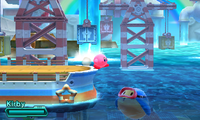Bountiful Star
| ||||||||||
|
| ||||||||||
"Bountiful Star" is a stage theme from Kirby: Planet Robobot that is primarily associated with the first stage of Overload Ocean. It was composed by Jun Ishikawa and is titled Track 021 in the Jukebox.
Composition[edit]

"Bountiful Star" is a feel-good beach-themed track that bears strikingly similar instrumentation and attributes to other distinct beach tracks such as "Float Islands", "Sea Stage", "Ripple Field: Ocean Waves", "Aqua Star" and the most recent, "Abandoned Beach". It is predominantly in C major, 4/4 and 150 BPM.
The theme starts off with the main chord progression of "I–ii–iii–ii", staying true to the its atmosphere. A pan flute synth opens with mediant keys that precedes the descending of the first scale degree that traverses down to the supertonic, being recited by a flute. Having slightly altered the tonic stability and chord progressions, a piano continues the phrase with charismatic notes that plays between the mediant, submediant and leading tone eventually developing steps and skips in this phrase and thus, reminiscent of the second section of "Float Islands". The next section includes an organ rendering the original mediants with a French horn following afterwards. As the trumpets repeat the conjunct motion of the melody in different octaves, and the "ARR1 synth" responds in a major resolution tone, the song transitions to its third section. A trumpet then picks up from the conjunct motion of the melody and paves the way for the flute to tonally create an unstable ascending sequence that will eventually reach a higher major seventh octave for the melody to conclude in six rapid fanfare notes and for the track to repeat its loop.
Names in other languages[edit]
| Language | Name | Meaning |
|---|---|---|
| Japanese | うるおいの星 uruoi no hoshi |
Moist Star うるおい can be read as both "moist" and "profitable." |
| French | Étoile généreuse | Generous star |
| German | Planet Profit | - |
| Italian | Pianeta redditizio | Profitable planet |
| Russian | Щедрая звезда Shchedraya zvezda |
Generous star |
| Spanish | Estrella benévola | Benevolent star |